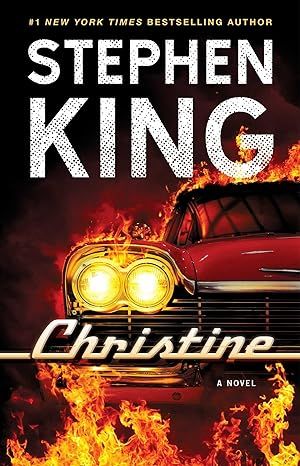Christine
4.6
-
5,023 ratings
Stephen King’s ultimate evil vehicle of terror, Christine: the frightening story of a nerdy teenager who falls in love with his vintage Plymouth Fury. It’s love at first sight, but this car is no lady.
Evil is alive in Libertyville. It inhabits a custom-painted red and white 1958 Plymouth Fury named Christine and young Arnold Cunningham, who buys it.
Along with Arnold’s girlfriend, Leigh Cabot, Dennis Guilder attempts to find out the real truth behind Christine and finds more than he bargained for: from murder to suicide, there’s a peculiar feeling that surrounds Christine—she gets revenge on anyone standing in her path.
Can Dennis save Arnold from the wrath of Christine? This #1 national bestseller is “Vintage Stephen King…breathtaking…awesome. Carries such momentum the reader must force himself to slow down” (The New York Times Book Review).
Kindle
$9.99
Available instantly
Audiobook
$0.00
with membership trial
Hardcover
$120.13
Paperback
$14.99
Ships from
Amazon.com
Payment
Secure transaction
ISBN-10
1501144189
ISBN-13
978-1501144189
Print length
656 pages
Language
English
Publisher
Scribner
Publication date
February 22, 2016
Dimensions
5.31 x 1.6 x 8.25 inches
Item weight
1.5 pounds
Popular highlights in this book
If being a kid is about learning how to live, then being a grown-up is about learning how to die.
Highlighted by 109 Kindle readers
‘Has it ever occurred to you,’ he said abruptly, ‘that parents are nothing but overgrown kids until their children drag them into adulthood? Usually kicking and screaming?’
Highlighted by 58 Kindle readers
Product details
ASIN :
B018ER7LLQ
File size :
3280 KB
Text-to-speech :
Enabled
Screen reader :
Supported
Enhanced typesetting :
Enabled
X-Ray :
Enabled
Word wise :
Enabled
Editorial reviews
Vintage King…breathtaking…awesome. Carries such momentum the reader must force himself to slow down. (The New York Times Book Review)
Dazzlingly well-written. (The Indianapolis Star)
Terrifying…King is aterrific storyteller. (San Francisco Chronicle)
Truly gripping…some of thebest writing King has ever done…the master has returned with a vengeance. (Publishers Weekly)
A certain blockbuster. (Chicago Tribune)
Terrific, eerily impressive, ominous…King really gets to you with his snarling, murderous monster on wheels. (The New York Times)
King’s best novel yet! Leave it to Stephen King to craftily conjure a wholly satisfying novel…the most frightening and compelling in recent memory…Like Carrie,it captures the kinetic energy and cultural wasteland of teenage milieu…Like The Shining, it displays psychological tensions and supernatural phenomena that jolt characters and readers alike. (Los Angeles News)
What’s better than a good spooky scare? Stephen King is expert at this dark art. …The superbly macabre Christine is truly memorable…it will frighten millions. (St. Louis Post Dispatch)
For horror fans, a prize in the King tradition. (Library Journal)
Plenty of gore…a story that races along in high gear. (Newsweek)
Great stuff…Read Stephen King’s new chiller, and you’ll never trust a 1958 Plymouth Fury again…Stephen King scares the pants off us, but he does with such style that we can’t be mad at him. (Southwest Magazine)
Like the movie director Steven Spielberg, King is a master of infusing life into inanimate objects or non-human forms. (The New York Times Book Review)
A brilliant conjuring up of terrors…the kind of story that could make you afraid to walk in front of you own car. (Milwaukee Journal)
Scary, satisfyingly intricate. (People)
A must read for King fans. (Newsday)
Horror with immense appeal…King has never been more readable. (Kirkus)
A riveting exploration of possession, the supernatural , and terror…King’s horrific visions, the growing terror of this small town, dance ghoulishly in the shadows of blinking headlights…Once again, King has created a world all too familiar with a nightmare. (Associated Press)
Hell hath no fury like a Fury scorned…readable and fast-paced, readers will love it. (Detroit News)
Stephen King’s mastery in conjuring up an aura of mystery and suspense will keep you glued to the pages. (King Features Syndicate)
No-holds-barred horror…achingly real. (Cleveland Plain Dealer)
Stephen King, the master of modern horror, takes the reader for a fast ride of ghoulish fun. (Atlanta Journal-Constitution)
King’s finest novel to date in which poignantly drawn teenagers become seduced by both the facts of life and the macabre fantasies of death. (Houston Chronicle)
Read more
Sample
Christine
1
First Views
“Oh my God!” my friend Arnie Cunningham cried out suddenly.
“What is it?” I asked. His eyes were bulging from behind his steel-rimmed glasses, he had plastered one hand over his face so that his palm was partially cupping his mouth, and his neck could have been on ball-bearings the way he was craning back over his shoulder.
“Stop the car, Dennis! Go back!”
“What are you—”
“Go back, I want to look at her again.”
Suddenly I understood. “Oh, man, forget it,” I said. “If you mean that . . . thing we just passed—”
“Go back!” He was almost screaming.
I went back, thinking that it was maybe one of Arnie’s subtle little jokes. But it wasn’t. He was gone, lock, stock, and barrel. Arnie had fallen in love.
She was a bad joke, and what Arnie saw in her that day I’ll never know. The left side of her windshield was a snarled spiderweb of cracks. The right rear deck was bashed in, and an ugly nest of rust had grown in the paint-scraped valley. The back bumper was askew, the trunk-lid was ajar, and upholstery was bleeding out through several long tears in the seat covers, both front and back. It looked as if someone had worked on the upholstery with a knife. One tire was flat. The others were bald enough to show the canvas cording. Worst of all, there was a dark puddle of oil under the engine block.
Arnie had fallen in love with a 1958 Plymouth Fury, one of the long ones with the big fins. There was an old and sun-faded FOR SALE sign propped on the right side of the windshield—the side that was not cracked.
“Look at her lines, Dennis!” Arnie whispered. He was running around the car like a man possessed. His sweaty hair flew and flopped. He tried the back door on the passenger side, and it came open with a scream.
“Arnie, you’re having me on, aren’t you?” I said. “It’s sunstroke, right? Tell me it’s sunstroke. I’ll take you home and put you under the frigging air conditioner and we’ll forget all about this, okay?” But I said it without much hope. He knew how to joke, but there was no joke on his face then. Instead, there was a kind of goofy madness I didn’t like much.
He didn’t even bother to reply. A hot, stuffy billow of air, redolent of age, oil, and advanced decomposition, puffed out of the open door. Arnie didn’t seem to notice that, either. He got in and sat down on the ripped and faded back seat. Once, twenty years before, it had been red. Now it was a faded wash pink.
I reached in and pulled up a little puff of upholstery, looked at it, and blew it away. “Looks like the Russian army marched over it on their way to Berlin,” I said.
He finally noticed I was still there. “Yeah . . . yeah. But she could be fixed up. She could . . . she could be tough. A moving unit, Dennis. A beauty. A real—”
“Here! Here! What you two kids up to?”
It was an old guy who looked as if he was enjoying—more or less—his seventieth summer. Probably less. This particular dude struck me as the sort of man who enjoyed very little. His hair was long and scraggy, what little there was left of it. He had a good case of psoriasis going on the bald part of his skull.
He was wearing green old man’s pants and lowtopped Keds. No shirt; instead there was something cinched around his waist that looked like a lady’s corset. When he got closer I saw it was a back brace. From the look of it I would say, just offhand, that he had changed it last somewhere around the time Lyndon Johnson died.
“What you kids up to?” His voice was shrill and strident.
“Sir, is this your car?” Arnie asked him. Not much question that it was. The Plymouth was parked on the lawn of the postwar tract house from which the old man had issued. The lawn was horrible, but it looked positively great with that Plymouth in the foreground for perspective.
“What if it is?” The old guy demanded.
“I”—Arnie had to swallow—“I want to buy it.”
The old dude’s eyes gleamed. The angry look on his face was replaced by a furtive gleam in the eye and a certain hungry sneer around the lips. Then a large resplendent shit-eating grin appeared. That was the moment, I think—then, just at that moment—when I felt something cold and blue inside me. There was a moment—just then—when I felt like slugging Arnie and dragging him away. Something came into the old man’s eyes. Not just the gleam; it was something behind the gleam.
“Well, you should have said so,” the old guy told Arnie. He stuck out his hand and Arnie took it. “LeBay’s the name. Roland D. LeBay. U.S. Army, retired.”
“Arnie Cunningham.”
The old sport pumped his hand and sort of waved at me. I was out of the play; he had his sucker. Arnie might as well have handed LeBay his wallet.
“How much?” Arnie asked. And then he plunged ahead. “Whatever you want for her, it’s not enough.”
I groaned inside instead of sighing. His checkbook had just joined his wallet.
For a moment LeBay’s grin faltered a little, and his eyes narrowed down suspiciously. I think he was evaluating the possibility that he was being put on. He studied Arnie’s open, longing face for signs of guile, and then asked the murderously perfect question:
“Son, have you ever owned a car before?”
“He owns a Mustang Mach II,” I said quickly. “His folks bought it for him. It’s got a Hurst shifter, a supercharger, and it can boil the road in first gear. It—”
“No,” Arnie said quietly. “I just got my driver’s license this spring.”
LeBay tipped me a brief but crafty gaze and then swung his full attention back to his prime target. He put both hands in the small of his back and stretched. I caught a sour whiff of sweat.
“Got a back problem in the Army,” he said. “Full disability. Doctors could never put it right. Anyone ever asks you what’s wrong with the world, boys, you tell em it’s three things: Doctors, commies, and nigger radicals. Of the three, commies is the worst, closely followed by doctors. And if they want to know who told you, tell em Roland D. LeBay. Yessir.”
He touched the old, scuffed hood of the Plymouth with a kind of bemused love.
“This here is the best car I ever owned. Bought her in September 1957. Back then, that’s when you got your new model year, in September. All summer long they’d show you pictures of cars under hoods and cars under tarps until you were fair dyin t’know what they looked like underneath. Not like now.” His voice dripped contempt for the debased times he had lived to see. “Brand-new, she was. Had the smell of a brand-new car, and that’s about the finest smell in the world.”
He considered.
“Except maybe for pussy.”
I looked at Arnie, nibbling the insides of my cheeks madly to keep from braying laughter all over everything. Arnie looked back at me, astounded. The old man appeared to notice neither of us; he was off on his own planet.
“I was in khaki for thirty-four years,” LeBay told us, still touching the hood of the car. “Went in at sixteen in 1923. I et dust in Texas and seen crabs as big as lobsters in some o them Nogales whoredens. I saw men with their guts comin out their ears during Big Two. In France I saw that. Their guts was comin out their ears. You believe that, son?”
“Yessir,” Arnie said. I don’t think he’d heard a word LeBay said. He was shifting from foot to foot as if he had to go to the bathroom bad. “About the car, though—”
“You go to the University?” LeBay barked suddenly. “Up there at Horlicks?”
“Nosir, I go to Libertyville High.”
“Good,” LeBay said grimly. “Steer clear of colleges. They’re full of niggerlovers that want to give away the Panama Canal. ‘Think-tanks,’ they call em. ‘Asshole-tanks,’ say I.”
He gazed fondly at the car sitting on its flat tire, its paintjob mellowing rustily in the late afternoon sunlight.
“Hurt my back in the spring of ’57,” he said. “Army was going to rack and ruin even then. I got out just in time. I came on back to Libertyville. Looked over the rolling iron. I took my time. Then I walked into Norman Cobb’s Plymouth dealership—where the bowling alley is now on outer Main Street—and I ordered this here car. I said you get it in red and white, next year’s model. Red as a fire-engine on the inside. And they did it. When I got her, she had a total of six miles on the odometer. Yessir.”
He spat.
I glanced over Arnie’s shoulder at the odometer. The glass was cloudy, but I could read the damage all the same: 97,432. And six-tenths. Jesus wept.
“If you love the car so much, why are you selling it?” I asked.
He turned a milky, rather frightening gaze on me. “Are you cracking wise on me, son?”
I didn’t answer, but I didn’t drop my gaze either.
After a few moments of eye-to-eye duelling (which Arnie totally ignored; he was running a slow and loving hand over one of the back fins), he said, “Can’t drive anymore. Back’s gotten too bad. Eyes are going the same way.”
Suddenly I got it—or thought I did. If he had given us the correct dates, he was seventy-one. And at seventy, this state makes you start taking compulsory eye exams every year before they’ll renew your driver’s license. LeBay had either failed his eye exam or was afraid of failing. Either way, it came to the same thing. Rather than submit to that indignity, he had put the Plymouth up. And after that, the car had gotten old fast.
“How much do you want for it?” Arnie asked again. Oh, he just couldn’t wait to be slaughtered.
LeBay turned his face up to the sky, appearing to consider it for rain. Then he looked down at Arnie again and gave him a large, kindly smile that was far too much like the previous shit-eating grin for me.
“I’ve been asking three hundred,” he said. “But you seem a likely enough lad. I’ll make it two-fifty for you.”
“Oh my Christ,” I said.
But he knew who his sucker was, and he knew exactly how to drive the wedge in between us. In the words of my grandfather, he hadn’t fallen off a haytruck yesterday.
“Okay,” he said brusquely. “If that’s how you want it. I got my four-thirty story to watch. Edge of Night. Never miss it if I can help it. Nice chinning with you boys. So long.”
Arnie threw me such a smoking look of pain and anger that I backed off a step. He went after the old man and took his elbow. They talked. I couldn’t hear it all, but I could see more than enough. The old man’s pride was wounded. Arnie was earnest and apologetic. The old man just hoped Arnie understood that he couldn’t stand to see the car that had brought him through safe to his golden years insulted. Arnie agreed. Little by little, the old man allowed himself to be led back. And again I felt something consciously dreadful about him . . . it was as if a cold November wind could think. I can’t put it any better than that.
“If he says one more word, I wash my hands of the whole thing,” LeBay said, and cocked a horny, callused thumb at me.
“He won’t, he won’t,” Arnie said hastily. “Three hundred, did you say?”
“Yes, I believe that was—”
“Two-fifty was the quoted price,” I said loudly.
Arnie looked stricken, afraid the old man would walk away again, but LeBay was taking no chances. The fish was almost out of the pond now.
“Two-fifty would do it, I guess,” LeBay allowed. He glanced my way again, and I saw that we had an understanding—he didn’t like me and I didn’t like him.
To my ever-increasing horror, Arnie pulled his wallet out and began thumbing through it. There was silence among the three of us. LeBay looked on. I looked away at a little kid who was trying to kill himself on a puke-green skateboard. Somewhere a dog barked. Two girls who looked like eighth-or ninth-graders went past, giggling and holding clutches of library books to their blooming chests. I had only one hope left for getting Arnie out of this; it was the day before payday. Given time, even twenty-four hours, this wild fever might pass. Arnie was beginning to remind me of Toad, of Toad Hall.
When I looked back, Arnie and LeBay were looking at two fives and six ones—all that had been in his wallet, apparently.
“How about a check?” Arnie asked.
LeBay offered Arnie a dry smile and said nothing.
“It’s a good check,” Arnie protested. It would be, too. We had been working all summer for Carson Brothers on the I-376 extension, the one which natives of the Pittsburgh area firmly believe will never be really finished. Arnie sometimes declared that Penn-DOT had begun taking bids on the I-376 work shortly after the Civil War ended. Not that either of us had any right to complain; a lot of kids were either working for slave wages that summer or not working at all. We were making good money, even clocking some overtime. Brad Jeffries, the job foreman, had been frankly dubious about taking a kid like Arnie on, but had finally allowed that he could use a flagman; the girl he had been planning to hire had gotten herself pregnant and had run off to get married. So Arnie had started off flagging in June but had gotten into the harder work little by little, running mostly on guts and determination. It was the first real job he’d ever had, and he didn’t want to screw it up. Brad was reasonably impressed, and the summer sun had even helped Arnie’s erupting complexion a little. Maybe it was the ultraviolet.
“I’m sure it’s a good check, son,” LeBay said, “but I gotta make a cash deal. You understand.”
I didn’t know if Arnie understood, but I did. It would be too easy to stop payment on a local check if this rustbucket Plymouth threw a rod or blew a piston on the way home.
“You can call the bank,” Arnie said, starting to sound desperate.
“Nope,” LeBay said, scratching his armpit above the scabrous brace. “It’s going on five-thirty. Bank’s long since closed.”
“A deposit, then,” Arnie said, and held out the sixteen dollars. He looked positively wild. It may be that you’re having trouble believing a kid who was almost old enough to vote could have gotten himself so worked up over an anonymous old clunk in the space of fifteen minutes. I was having some trouble believing it myself. Only Roland D. LeBay seemed not to be having trouble with it, and I supposed it was because at his age he had seen everything. It was only later that I came to believe that his odd sureness might come from other sources. Either way, if any milk of human kindness had ever run in his veins, it had curdled to sour cream long ago.
“I’d have to have at least ten percent down,” LeBay said. The fish was out of the water; in a moment it would be netted. “If I had ten percent, I’d hold her for twenty-four hours.”
“Dennis,” Arnie said. “Can you loan me nine bucks until tomorrow?”
I had twelve in my own wallet, and no particular place to go. Day after day of spreading sand and digging trenches for culverts had done wonders when it came to getting ready for football practice, but I had no social life at all. Lately I hadn’t even been assaulting the ramparts of my cheerleader girlfriend’s body in the style to which she had become accustomed. I was rich but lonely.
“Come on over here and let’s see,” I said.
LeBay’s brow darkened, but he could see he was stuck with my input, like it or not. His frizzy white hair blew back and forth in the mild breeze. He kept one hand possessively on the Plymouth’s hood.
Arnie and I walked back toward where my car, a ’75 Duster, was parked at the curb. I put an arm around Arnie’s shoulders. For some reason I remembered the two of us up in his room on a rainy fall day when we were both no more than six years old—cartoons flickering on an ancient black-and-white TV as we colored with old Crayolas from a dented coffee can. The image made me feel sad and a little scared. I have days, you know, when it seems to me that six is an optimum age, and that’s why it only lasts about 7.2 seconds in real time.
“Have you got it, Dennis? I’ll get it back to you tomorrow afternoon.”
“Yeah, I’ve got it,” I said. “But what in God’s name are you doing, Arnie? That old fart has got total disability, for Christ’s sake. He doesn’t need the money and you’re not a charitable institution.”
“I don’t get it. What are you talking about?”
“He’s screwing you. He’s screwing you for the simple pleasure of it. If he took that car to Darnell’s, he couldn’t get fifty dollars for parts. It’s a piece of shit.”
“No. No, it isn’t.” Without the bad complexion, my friend Arnie would have looked completely ordinary. But God gives everyone at least one good feature, I think, and with Arnie it was his eyes. Behind the glasses that usually obscured them they were a fine and intelligent gray, the color of clouds on an overcast autumn day. They could be almost uncomfortably sharp and probing when something was going on that he was interested in, but now they were distant and dreaming. “It’s not a piece of shit at all.”
That was when I really began to understand it was more than just Arnie suddenly deciding he wanted a car. He had never even expressed an interest in owning one before; he was content to ride with me and chip in for gas or to pedal his three-speed. And it wasn’t as if he needed a car so he could step out; to the best of my knowledge Arnie had never had a date in his life. This was something different. It was love, or something like it.
I said, “At least get him to start it for you, Arnie. And get the hood up. There’s a puddle of oil underneath. I think the block might be cracked. I really think—”
“Can you loan me the nine?” His eyes were fixed on mine.
I gave up. I took out my wallet and gave him the nine dollars.
“Thanks, Dennis,” he said.
“Your funeral, man.”
He took no notice. He put my nine with his sixteen and went back to where LeBay stood by the car. He handed the money over and LeBay counted it carefully, wetting his thumb.
“I’ll only hold it for twenty-four hours, you understand,” LeBay said.
“Yessir, that’ll be fine,” Arnie said.
“I’ll just go in the house and write you out a receipt,” he said. “What did you say your name was, soldier?”
Arnie smiled a little. “Cunningham. Arnold Cunningham.”
LeBay grunted and walked across his unhealthy lawn to his back door. The outer door was one of those funky aluminum combination doors with a scrolled letter in the center—a big L in this case.
The door slammed behind him.
“The guy’s weird, Arnie. The guy is really fucking w—” But Arnie wasn’t there. He was sitting behind the wheel of the car. That same sappy expression was on his face.
I went around to the front and found the hood release. I pulled it, and the hood went up with a rusty scream that made me think of the sound effects you hear on some of those haunted-house records. Flecks of metal sifted down. The battery was an old Allstate, and the terminals were so glooped up with green corrosion that you couldn’t tell which was positive and which was negative. I pulled the air cleaner and looked glumly into a four-barrel carb as black as a mineshaft.
I lowered the hood and went back to where Arnie was sitting, running his hand along the edge of the dashboard over the speedometer, which was calibrated up to an utterly absurd 120 miles per hour. Had cars ever really gone that fast?
“Arnie, I think the engine block’s cracked. I really do. This car is lunch, my friend. It’s just total lunch. If you want wheels, we can find you something a lot better than this for two-fifty. I mean it. A lot better.”
“It’s twenty years old,” he said. “Do you realize a car is officially an antique when it’s twenty years old?”
“Yeah,” I said. “The junkyard behind Darnell’s is full of official antiques, you know what I mean?”
“Dennis—”
The door banged. LeBay was coming back. It was just as well; further discussion would have been meaningless. I may not be the world’s most sensitive human being, but when the signals are strong enough, I can pick them up. This was something Arnie felt he had to have, and I wasn’t going to talk him out it. I didn’t think anyone was going to talk him out of it.
LeBay handed him the receipt with a flourish. Written on a plain sheet of notepaper in an old man’s spidery and slightly trembling script was: Received from Arnold Cunningham, $25.00 as a 24-hr. deposit on 1958 Plymouth, Christine. And below that he had signed his name.
“What’s this Christine?” I asked, thinking I might have misread it or he might have misspelled it.
His lips tightened and his shoulders went up a little, as if he expected to be laughed at . . . or as if he were daring me to laugh at him. “Christine,” he said, “is what I always called her.”
“Christine,” Arnie said. “I like it. Don’t you, Dennis?”
Now he was talking about naming the damned thing. It was all getting to be a bit much.
“What do you think, Dennis, do you like it?”
“No,” I said. “If you’ve got to name it, Arnie, why don’t you name it Trouble?”
He looked hurt at that, but I was beyond caring. I went back to my car to wait for him, wishing I had taken a different route home.
Read more
About the authors
Stephen King
Stephen King is the author of more than fifty books, all of them worldwide bestsellers. His first crime thriller featuring Bill Hodges, MR MERCEDES, won the Edgar Award for best novel and was shortlisted for the CWA Gold Dagger Award. Both MR MERCEDES and END OF WATCH received the Goodreads Choice Award for the Best Mystery and Thriller of 2014 and 2016 respectively.
King co-wrote the bestselling novel Sleeping Beauties with his son Owen King, and many of King's books have been turned into celebrated films and television series including The Shawshank Redemption, Gerald's Game and It.
King was the recipient of America's prestigious 2014 National Medal of Arts and the 2003 National Book Foundation Medal for distinguished contribution to American Letters. In 2007 he also won the Grand Master Award from the Mystery Writers of America. He lives with his wife Tabitha King in Maine.
Read more
Reviews
Customer reviews
4.6 out of 5
5,023 global ratings
Harry Heap
5
Great novel
Reviewed in the United States on July 8, 2024
Verified Purchase
Great read and a must have for fans of Stephen King. The movie adaptation was great too.
Greggorio!
5
HE JUST MAKES IT ALL SEEM SO REAL!
Reviewed in the United States on April 2, 2013
Verified Purchase
Stephen King is a genius. CHRISTINE is a masterpiece. It is the most traumatic, shocking, horrific, frightening and yet unequivocally brilliant piece of fiction that I have ever read. It is a horror novel. It is a love story. It is a tragedy. That is a review in its own right, but I choose to continue. Because this is fun.
The story goes like this: A young lad by the name of Arnie Cunningham is cruising the streets of his hometown with his pal Dennis ... When Arnie just happens to catch a glimpse of a vision of something that he never knew that he wanted. A 1958 Plymouth Fury sedan. The problem is, the car is a wreck, it is a rust bucket which shouldn't be on the road. And there is no way in hell that our Arnie can afford to fix it up. Dennis can see it for what it is but he cant make his pal Arnie see the wood for the trees. But Arnie buys it anyway. Because when Arnie looks at this particular Plymouth he doesn't see what everyone else sees. He sees a stud bucket on wheels. He sees success. He sees easy living. He sees everything he has ever wanted without ever realising he wanted it. In other words, the devil has come to Libertyville and he has set his sights on Arnold Cunningham as his first victim.
Stephen King has always been a delight to read. In CHRISTINE, his writing is suspenseful, compelling and at times down right addictive. Given that the book was written back in the 1980s it still holds up remarkably well today. At times, CHRISTINE is shocking, but in a good way. You switch on the kindle (or open your book) and see an innocent and innocuous looking chapter introduction that (so my kindle tells me) will take me 15 minutes to read but once you read this chapter you are faced with the choice of re-reading it for the simple joy of it, or rushing straight on to the next chapter even though it is a work day and it is well past your bed time. Personally, i tend to re-read them. His "shocking" chapters are classic Stephen King gore fests, which are gruesome, highly enjoyable rides of absolute terror and completely unexpected. Hence the shock factor. They can also be quite moving and emotional once your heart beat and blood pressure drop back to normal levels. And also once you have regained your grip on reality and your own sanity.
Reading CHRISTINE is like attending a master class in writing sophisticated horror fiction. As always with Mr King, his characterisation stands out like high powered fog lamps on a brand new 4WD motor vehicle. His plot is sufficiently complicated and complex that the book never seems long despite its 746 pages. I have already mentioned its gore factor, the shocks and the unremitting terror in the second half. And so to the ending. It is perfect. It is brilliant, shocking and yet, heartbreakingly sad. The perfect (horrific) ending to the perfect horror novel. Brilliant stuff.
BFN, Greggorio.
Read more
9 people found this helpful
Jeff Wignall
5
A very entertaining, if somewhat bizarre, tale that will keep you turning the pages
Reviewed in the United States on March 26, 2015
Verified Purchase
I have read a lot of short stories and novellas by Stephen King, but this is the first full-length novel of his I've read in a long time and I'm glad that I read it. I'm a writer and a large part of the reason that I read that book was that I wanted to study the way that King crafted a longer work, just purely from a structural point-of-view and this was definitely the right book to read for that.
While I found that the story dragged a bit at times and at times I skipped over some of the "internal" dialogue of the narrator (he analyzes himself a lot and those thoughts are a running part of the narration--and sometimes too long winded), I found that overall the character development was exceedingly well done. I took my time reading the book, just 20 pages or so a day, but it was fun that way and I looked forward to going back to it.
The violence isn't really that disturbing in the book and you have to suspend disbelief so much to accept the plot to begin with that the violence doesn't seem that real anyway. In fact, the whole premise is so ludicrous that if it wasn't for the great writing, you'd toss the book back down after a few chapters. But, because the characters are so strong and their motivations so real and believable, you stick with it. Again, at times thing dragged on and if I were his editor, I could have easily chopped out 50 pages and not disturbed the story in any way. But hey, if you like the characters, like the storyline, who cares if it drags on now and again. Also, the point-of-view changes from first person to third person to first person in the three sections of the book, which is a kind of interesting twist.
Overall I think this is a really interesting read and probably worth the read just for diversion sake. If you're looking for reality, King is (in this book at least) the wrong place to look. But if you have a kind of "what if..." imagination, I think this classic work will entertain you a lot. I loved it. Oh, and if you are a writer, you'll learn a lot about your craft.
Read more
3 people found this helpful
Top Stephen King titles
View all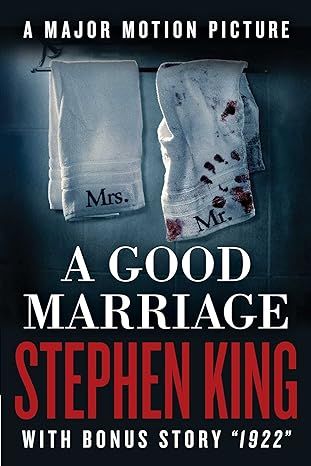
A Good Marriage
4.1
-
5,995
$4.99
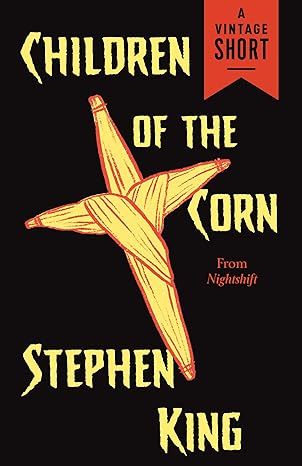
Children of the Corn (Kindle Single) (A Vintage Short)
4.3
-
1,084
$0.99
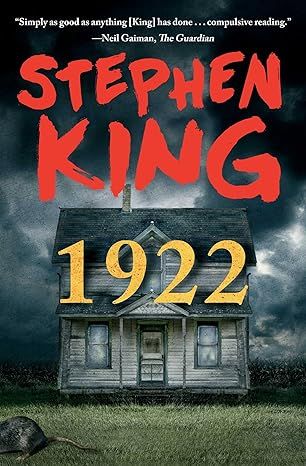
1922
4.6
-
6,082
$7.99
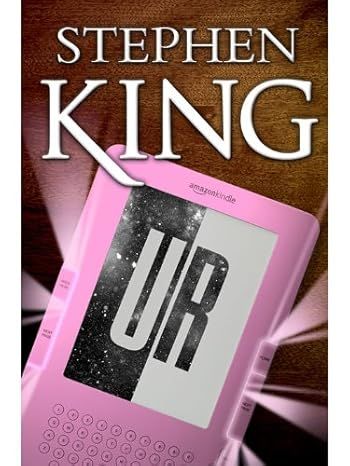
UR
4.3
-
6,140
$3.99
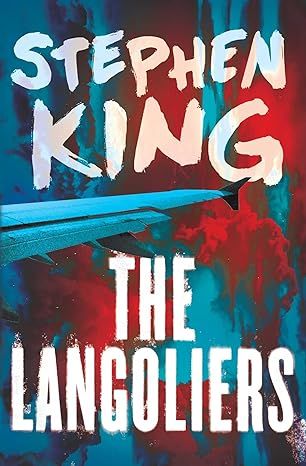
The Langoliers
4.6
-
1,014
$6.49

The Girl Who Loved Tom Gordon: A Novel
4.5
-
4,774
$1.17
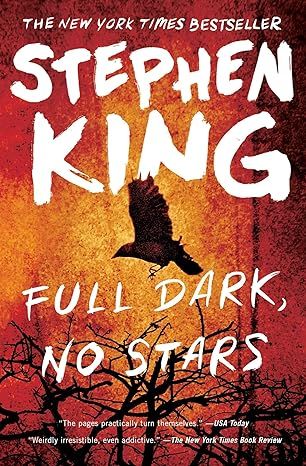
Full Dark, No Stars
4.6
-
6,762
$5.00

Gwendy's Button Box: A Novella (Gwendy's Button Box Trilogy Book 1)
4.5
-
21,335
$3.88
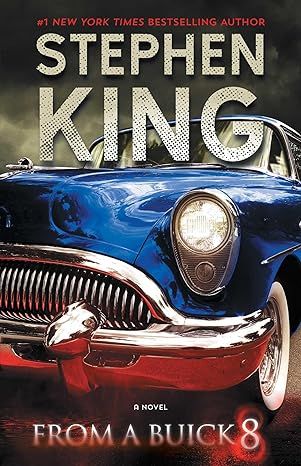
From a Buick 8: A Novel
4.3
-
2,174
$11.99
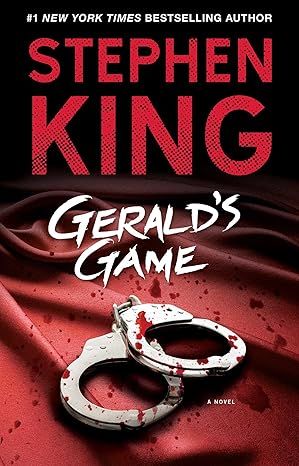
Gerald's Game
4.2
-
3,838
$1.97
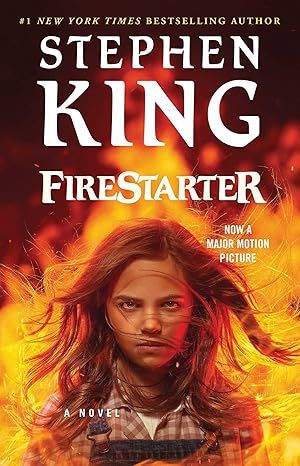
Firestarter
4.6
-
5,489
$9.99
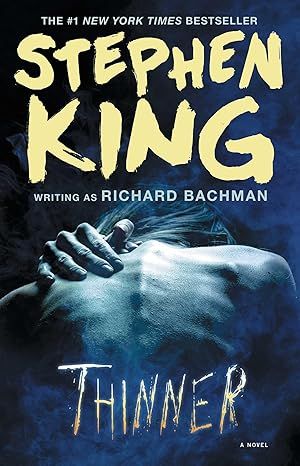
Thinner
4.5
-
3,107
$2.50
Similar Books
Best sellers
View all
The Tuscan Child
4.2
-
100,022
$8.39

The Thursday Murder Club: A Novel (A Thursday Murder Club Mystery)
4.3
-
155,575
$6.33

Sapiens: A Brief History of Humankind
4.6
-
140,302
$13.49

The Butterfly Garden (The Collector, 1)
4.3
-
88,556
$9.59

Things We Hide from the Light (Knockemout Series, 2)
4.4
-
94,890
$11.66

The Last Thing He Told Me: A Novel
4.3
-
154,085
$2.99

The Perfect Marriage: A Completely Gripping Psychological Suspense
4.3
-
143,196
$9.47

The Coworker
4.1
-
80,003
$13.48

First Lie Wins: A Novel (Random House Large Print)
4.3
-
54,062
$14.99

Mile High (Windy City Series Book 1)
4.4
-
59,745
$16.19

Layla
4.2
-
107,613
$8.99

The Locked Door
4.4
-
94,673
$8.53
